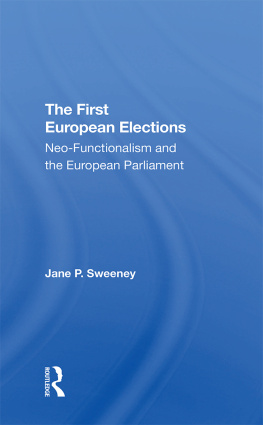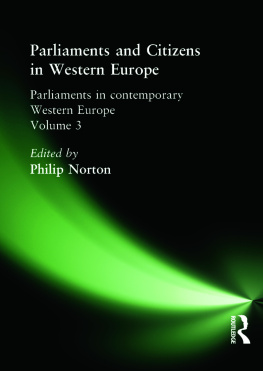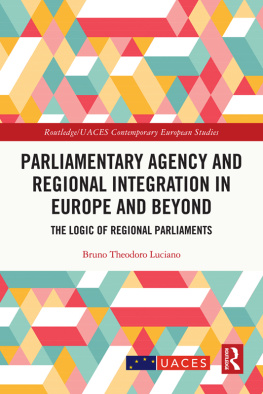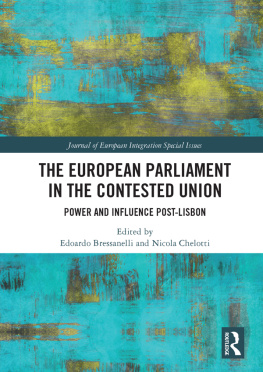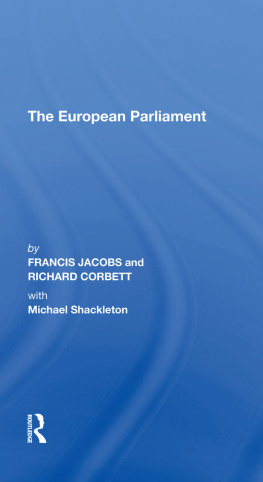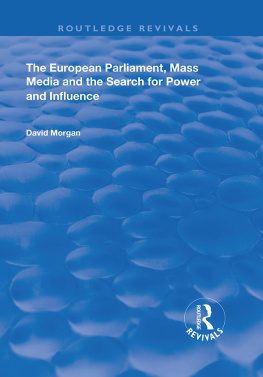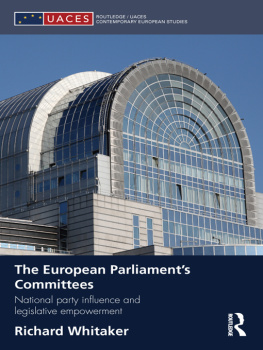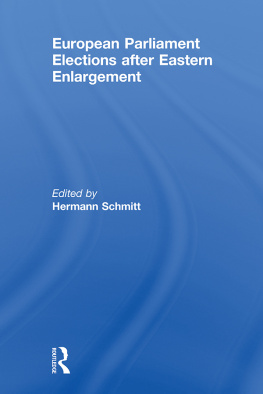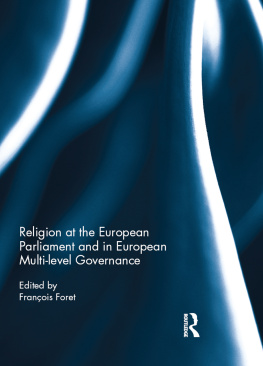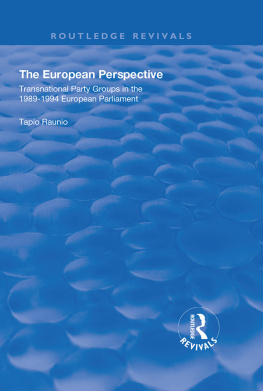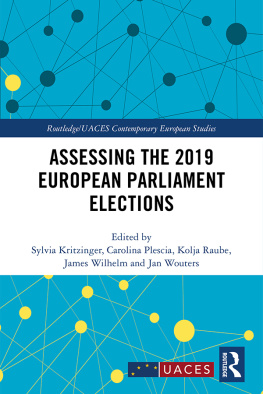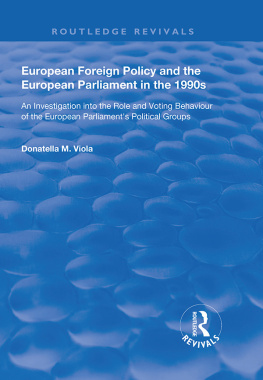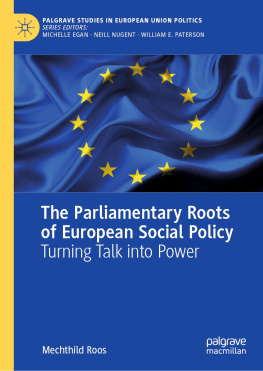The First European Elections
Westview Replica Editions
The concept of Westview Replica Editions is a response to the continuing crisis in academic and informational publishing. Library budgets for books have been severely curtailed. Ever larger portions of general library budgets are being diverted from the purchase of books and used for data banks, computers, micromedia, and other methods of information retrieval. Interlibrary loan structures further reduce the edition sizes required to satisfy the needs of the scholarly community. Economic pressures on the university presses and the few private scholarly publishing companies have severely limited the capacity of the industry to properly serve the academic and research communities. As a result, many manuscripts dealing with important subjects, often representing the highest level of scholarship, are no longer economically viable publishing projectsor, if accepted for publication, are typically subject to lead times ranging from one to three years.
Westview Replica Editions are our practical solution to the problem. We accept a manuscript in camera-ready form, typed according to our specifications, and move it immediately into the production process. As always, the selection criteria include the importance of the subject, the work's contribution to scholarship, and its insight, originality of thought, and excellence of exposition. The responsibility for editing and proofreading lies with the author or sponsoring institution. We prepare chapter headings and display pages, file for copyright, and obtain Library of Congress Cataloging in Publication Data. A detailed manual contains simple instructions for preparing the final typescript, and our editorial staff is always available to answer questions.
The end result is a book printed on acid-free paper and bound in sturdy library-quality soft covers. We manufacture these books ourselves using equipment that does not require a lengthy make-ready process and that allows us to publish first editions of 300 to 600 copies and to reprint even smaller quantities as needed. Thus, we can produce Replica Editions quickly and can keep even very specialized books in print as long as there is a demand for them.
About the Book and Author
The First European Elections: Neo-Functionalism and the European Parliament
Jane P. Sweeney
The first direct election of the European Parliament in 1979 was hailed as an event that would bring new momentum to the process of building a united Europe. That the first election did not have the expected outcome, argues the author of this book, can be attributed to flaws in the "Community method," which reflects the EEC's reliance on neo-functionalism. Dr. Sweeney investigates her hypothesis through a study of the 1979 electoral campaigns of the West German SPD, French Parti Socialiste, and British Labour Party, emphasizing the question of transnational cooperation among these members of the Confederation of Socialist Parties of the European Community. Her discussion of the Confederation's attempt to organize a united campaign among its nine constituent parties is based on extensive research on the workings of Parliament's political groups and on interviews and field work conducted before and after the June 1979 elections.
With the second direct election due to take place in 1984, the European Parliament's powers have not expanded, and once again there is concern about how to interest the public and the parties in the elected Parliament. Dr. Sweeney concludes that the present structure of the EEC is an impediment to political integration and suggests that national parties and European citizens will become concerned only when the Parliament has the power to make decisions that affect them.
Dr. Sweeney is an assistant professor of political science at St. John's University, New York.
Published in cooperation with the Commission of the European Communities
The First European Elections
Neo-Functionalism and the European Parliament
Jane P. Sweeney
First published 1984 by Westview Press, Inc.
Published 2019 by Routledge
52 Vanderbilt Avenue, New York, NY 10017
2 Park Square, Milton Park, Abingdon, Oxon OX14 4RN
Routledge is an imprint of the Taylor & Francis Group, an informa business
Copyright 1984 Taylor & Francis
All rights reserved. No part of this book may be reprinted or reproduced or utilised in any form or by any electronic, mechanical, or other means, now known or hereafter invented, including photocopying and recording, or in any information storage or retrieval system, without permission in writing from the publishers.
Notice:
Product or corporate names may be trademarks or registered trademarks, and are used only for identification and explanation without intent to infringe.
Library of Congress Catalog Card Number: 83-51101
ISBN 13: 978-0-367-29215-7 (hbk)
To my parents, Robert and Doris Sweeney, whose concern about the role of politics in securing the rights of ordinary people has become mine
"The voice of the spirit of Europe" is the European Commission's description of the Community's 434 member Parliament. Four years after the European Parliament's historic first direct election by the citizens of nine countries, that voice is barely audible and one must pause to wonder whether the spirit is equally weak. The European Parliament is potentially one of the most interesting legislative bodies in the world because of the circumstances which created it, its unique transnational composition, and the power it may some day wield. However, the gap between the real and the possible is very large indeed.
This study, begun as my doctoral dissertation, is essentially two things at once: an investigation of neo-functionalist integration theory on which the European Community was premised, and an account of the roles of three political parties in the first European elections of June 1979. The direct election of the Parliament, an important event for the Community in itself, is used here as a vehicle for examining the dynamics of political integration. Specifically, I am interested in the role of the electoral process in strengthening transnational bonds within the European Community.
explores neo-functionalist theory in some depth. While this theory is now pass and its chief proponents have gone off to other intellectual endeavors, it is important to recall that it is the method of integration set into motion by the Treaty of Rome which created the European Community on January 1, 1958. That is, while scholars today are not advocating a neo-functionalist approach to integrating a region, this continues to be the "Community method." Hence, it is necessary to return to the theory and to try to establish where its flaws lie, to attempt to discover if the method itself is responsible for the stagnation of political integration among the member states.
The second direct election will take place in June 1984, and as of now it seems that it will be a less exciting re-run of the first. The Parliament has not, on the strength of the prestige it was hoped would flow from democratic legitimacy, been able to expand its legal competence. True, the directly elected Members of the European Parliament (MEPs) have been more conscious of their prerogatives and more willing to challenge Council and Commission than were the former appointed MEPs, but their skirmishes have led to little in the way of concrete results. An example: as of summer 1983 it was expected that in the next few months Parliament would exercise its power to dismiss the entire fourteen member Commission of the European Communities. Why? Not to protest any particular action on the Commission's part, but to raise Parliament's profile as a hedge against expected voter apathy in the 1984 election.

